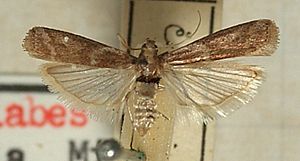Honeydew moth facts for kids
Quick facts for kids Honeydew moth |
|
|---|---|
 |
|
| Scientific classification | |
| Kingdom: | |
| Phylum: | |
| Class: | |
| Order: | |
| Family: |
Pyralidae
|
| Genus: |
Cryptoblabes
|
| Species: |
C. gnidiella
|
| Binomial name | |
| Cryptoblabes gnidiella (Millière, 1867)
|
|
| Synonyms | |
|
|
The honeydew moth, also known as the Christmasberry moth, is a small insect. Its scientific name is Cryptoblabes gnidiella. This moth belongs to the Pyralidae family, which includes many types of snout moths.
Contents
Meet the Honeydew Moth
The honeydew moth is a fascinating creature. It's known for its unique diet and where it likes to live. Let's learn more about this tiny moth.
What Does It Look Like?
The honeydew moth is quite small. Its wingspan is usually between 11 and 20 millimeters. That's about the width of a small coin!
Where Do They Live?
This moth originally comes from around the Mediterranean Sea. This area includes countries like Spain, Italy, and Greece. However, it has traveled to other parts of the world. You can now find it in South America and Middle America.
What Do They Eat?
The honeydew moth has different eating habits depending on its life stage.
Caterpillar Diet
When it's a caterpillar, the honeydew moth loves to munch on fruits. It feeds on many types of citrus fruits, like oranges and lemons. It also enjoys apples and maize (corn).
Adult Moth Diet
Adult honeydew moths have a sweet tooth! They feed on a sugary liquid called honeydew. This sweet substance is often left behind by other insects on plants. The moth is also often found near the Christmasberry plant. This is likely because the plant provides a good source of honeydew.
Why Are They Important?
The honeydew moth is sometimes seen as a pest. This is because its caterpillars can damage many different plants. They especially like to feed on cultivated fruits. These include grapes, lemons, and pomegranates. When many moths are present, they can cause problems for farmers.

